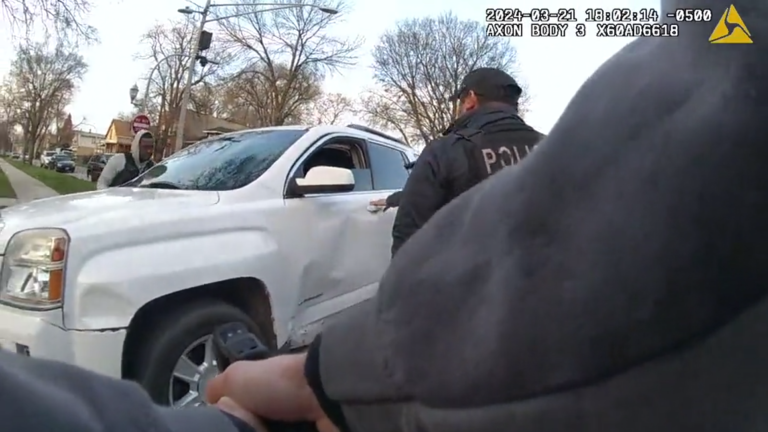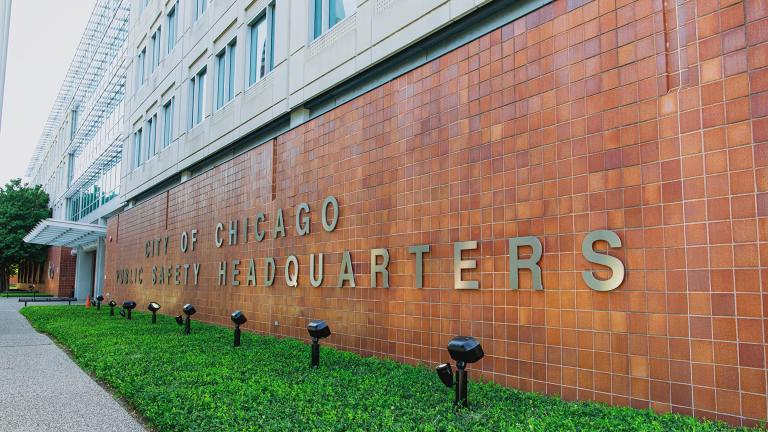Video: Several city council members are calling for a hearing on the mental health challenges faced by Chicago Police officers after a fourth officer dies by suicide, this year alone. Robert Sobo, Director of the Employee Assistance Program for the Chicago Police Department; Matt Richards, Deputy Commissioner for Behavior Health for the City of Chicago; Alexa James, CEO of the National Alliance on Mental Illness Chicago; and Kimberly Marshall, a former Chicago police officer join “Chicago Tonight” to discuss those challenges and available resources. (Produced by Jennifer Cotto)
After three Chicago Police Department employees died by suicide in recent weeks, the city’s top cop is defending his decision to cancel days off during the historically violent summer months. But Chicago’s largest police union says the department needs to change course to improve officer wellness.
Police Superintendent David Brown said his department has for years canceled days off at specific points throughout the summer to ensure there’s enough officers working each shift in order to protect each other if a dangerous situation arises.
“Would you rather have officers coming to help you when you’re being shot at? Or not enough officers at work and no one coming to help you,” he said during a press conference Monday morning. “That’s the really tough, tough, tough decision that superintendents have made for the last 30 years. And they all have made similar decisions that I made.”
Brown said his officers get 104 regular days off each year, of which an average of 20 are canceled, including eight days between Memorial Day and Labor Day, when there have historically been increases in violent crime throughout the city. He also claimed the department does not cancel officers’ vacation or personal days.
But the Fraternal Order of Police Lodge 7 accused Brown of being dishonest, saying this policy is “brand new” to officers, who they said are unable to take personal days because Brown “has restricted ALL days off, including personal days.”
“This has NOT been happening for years as he has said over and over again,” the FOP said in a tweet Monday. “The Superintendent is lying to the media and the people of Chicago.”
The FOP said it has filed multiple complaints of unfair labor practices and breach of contract against the police department stemming from the canceled days off.
Alexa James, CEO of the National Alliance on Mental Illness Chicago who previously worked as the CPD’s senior adviser of wellness, was also reportedly critical of the canceled days off, telling the Chicago Sun-Times over the weekend that she thinks “what’s happening is inhumane.”
These comments come after a third CPD employee died by suicide in July. Two officers died in recent weeks and a sergeant also reportedly died over the weekend. Without getting into specifics, Brown claimed canceled days off were “not a common theme” for these employees.
Brown has repeatedly stated his belief that the last couple years have been the most difficult time to be a police officer. So far this year, 34 Chicago police officers have been shot at or shot in the line of duty. Seven of those officers were actually shot.
Department officials on Monday highlighted what they’re doing to improve officer wellness, pointing to both faith-based counseling programs and the Employee Assistance Program (EAP), which offers clinical therapists and counselors to all active and retired members.
The CPD is currently in the process of hiring a chief medical officer, Brown said, who will be able to provide additional oversight.
According to EAP Director Dr. Robert Sobo, all CPD employees undergo training to help them recognize the signs and symptoms of distress, anxiety and depression, and help those people get connected with available resources to help.
The police department currently has 11 licensed clinicians, according to Sobo, with three more set to begin working in the coming weeks. The goal, he said, is to have one clinician hired for each of the CPD’s 25 police districts so that person can be part of each district’s unique culture.
“That isn’t just a face out there that they know they can reach out to, but it’s a familiar person, a trusted person,” Sobo said. “Someone they know that they can go to because we want to assure that the barriers to receiving services are taken away with trust, familiarity and having someone they can count on and that they know (is) available to them.”
Note: This story was originally published July 18. It has been updated to include our “Chicago Tonight” discussion.
Contact Matt Masterson: @ByMattMasterson | [email protected] | (773) 509-5431








